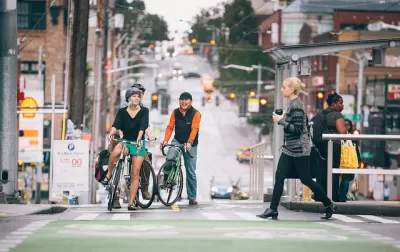The city of Seattle is working on a plan to create a zero-emissions zone to mitigate urban pollution and reduce carbon emissions in dense, congested parts of the city.

In order to meet its commitment to the C40 Fossil-Fuel-Free Streets Declaration, Seattle has released a memo draft that outlines the city's plan to implement an emissions-free zone, reports Ryan Packer for The Urbanist.
While many details of the proposal are redacted, the memo mentions two strategies that the city plans to implement, says Packer: "utilizing street space in commercial business districts (like with the Ballard Avenue cafe street or The Patio common restaurant seating area in Columbia City) and designating residential streets local-access-only with the Stay Healthy Streets program and the Home Zone pilots programs."
Seattle first signed on to the C40 pledge in 2017, one of 12 cities to do so at the time. Strategies employed by other cities include cordon pricing for vehicles entering central zones, pedestrianizing streets, and improving bike and pedestrian infrastructure. On its website, the C40 calls low-emission zones (LEZs) "a way for cities to take ambitious action more quickly in a priority area," letting cities expand the programs as results become apparent.
Planetizen has previously covered plans for zero-emissions neighborhoods in Santa Monica, where a designated zero-emissions delivery zone gives priority access to clean vehicles, and Bergen, which plans to transform a former shipping district to a 'regenerative' car-free zone that relies on low-impact mobility and access to the city's public transit system.
FULL STORY: Four Years Later, Seattle Emissions-Free Area Has Gone From Promise to Draft Plan

Planetizen Federal Action Tracker
A weekly monitor of how Trump’s orders and actions are impacting planners and planning in America.

Restaurant Patios Were a Pandemic Win — Why Were They so Hard to Keep?
Social distancing requirements and changes in travel patterns prompted cities to pilot new uses for street and sidewalk space. Then it got complicated.

Map: Where Senate Republicans Want to Sell Your Public Lands
For public land advocates, the Senate Republicans’ proposal to sell millions of acres of public land in the West is “the biggest fight of their careers.”

Maui's Vacation Rental Debate Turns Ugly
Verbal attacks, misinformation campaigns and fistfights plague a high-stakes debate to convert thousands of vacation rentals into long-term housing.

San Francisco Suspends Traffic Calming Amidst Record Deaths
Citing “a challenging fiscal landscape,” the city will cease the program on the heels of 42 traffic deaths, including 24 pedestrians.

California Homeless Arrests, Citations Spike After Ruling
An investigation reveals that anti-homeless actions increased up to 500% after Grants Pass v. Johnson — even in cities claiming no policy change.
Urban Design for Planners 1: Software Tools
This six-course series explores essential urban design concepts using open source software and equips planners with the tools they need to participate fully in the urban design process.
Planning for Universal Design
Learn the tools for implementing Universal Design in planning regulations.
Heyer Gruel & Associates PA
JM Goldson LLC
Custer County Colorado
City of Camden Redevelopment Agency
City of Astoria
Transportation Research & Education Center (TREC) at Portland State University
Camden Redevelopment Agency
City of Claremont
Municipality of Princeton (NJ)





























